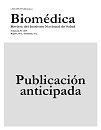Potentially inappropriate medication on community-dwelling older adults: Longitudinal analysis of IMIAS study
Abstract
Introduction. Medications are a fundamental part of the treatment of multiple pathologies, however, despite their benefits, some are considered potentially inappropriate medications (PIM) in the elderly given their safety profile. Differences in the epidemiological data related to PIMs contribute to the difficulty of determining the effects of these in the elderly.
Objective. Estimate the prevalence and types of PIM using the 2019 Beers criteria in adults older than 65 years in a cohort.
Materials and methods. Observational, multicenter, retrospective, longitudinal study of 4 years of follow-up of PIM in community-dwelling older adults.
Results. 820 participants from 5 different cities, were followed for 4 years (m1= 2012, m2= 2014 and m3= 2016), the mean age was 69.07 years, 50.9% were women. The PIM prevalence in the participants was 40.24%. The mean PIM among the subjects studied in m1 was 1.65 (SD: 0.963), in m2 it was 1.73 (SD: 1.032) and in m3 was 1.62 (SD: 0.915), there were no statistical differences between measurements (Friedman test p value = 0.204). The most frequent PIM categories were: gastrointestinal (39.4%), analgesics (18.8%), delirium-related drugs (15.4%), benzodiazepines (15.2), and cardiovascular (14.2%).
Conclusions. The prescription of PIM was present in a sustained manner and without significant variability over time in about half of the population of community-dwelling older adults, mainly gastrointestinal drugs, analgesics, delirium-related drugs, benzodiazepines, and cardiovascular use.
Downloads
Some similar items:
- Juanita Camacho, Diana Moscote, Yoseth J. Ariza , HIV in women over 50 years: An analysis of administrative data in the departments of the Colombian Pacific region (2014-2018) , Biomedica: Vol. 41 No. Sp. 2 (2021): Octubre, Infecciones bacterianas y virales
- Alejandra Fernández, Fernando Gómez, Carmen-Lucía Curcio, Edison Pineda, Juliana, Prevalence and impact of potentially inappropriate medication on community-dwelling older adults , Biomedica: Vol. 41 No. 1 (2021)
- Sandra Lorena Girón, Julio César Mateus, Fabián Méndez, Impact of an open waste disposal site on the occurrence of respiratory symptoms and on health care costs of children , Biomedica: Vol. 29 No. 3 (2009)
- Andrés Leonardo González, Ruth Aralí Martínez, Luis Ángel Villar, Clinical evolution of dengue in hospitalized patients , Biomedica: Vol. 28 No. 4 (2008)
- Ligia Inés Moncada, Sandra Milena Rios, Julián Alfredo Fernández, Fabio Rivas, María Luz Sáenz, Pediculosis prevalence and associated risk factors in a nursery school, Bogotá, Colombia , Biomedica: Vol. 28 No. 2 (2008)
- Guillermo Mora, María Clara Echeverry, Gustavo Enrique Rey, Myriam Consuelo López, Luisa Fernanda Posada, Fabio Aurelio Rivas, Frequency of Trypanosoma cruzi infection in patients with implanted pacemaker , Biomedica: Vol. 27 No. 4 (2007)
- Francisca Monsalve, Leonor Chacín Bonilla, Ricardo José Atencio, Leticia Denys Porto, Luciana Ana Costa León, Jesús Enrique Estévez, Diana Estela Callejas Valero, Low prevalence of hepatitis C virus infection in a prisoner population from Maracaibo, Venezuela , Biomedica: Vol. 29 No. 4 (2009)
- María del Pilar Chaves, Julián Alfredo Fernández, Isabel Ospina, Myriam Consuelo López, Ligia Moncada, Patricia Reyes, Giardia duodenalis prevalence and associated risk factors in preschool and school-age children of rural Colombia , Biomedica: Vol. 27 No. 3 (2007)
- Adriana Valdelamar , Fernando De La Hoz , Ricardo Sánchez , Loneliness as a predictor of mortality in cancer patients. A cohort study. Soledad y mortalidad en cáncer , Biomedica: Vol. 44 No. Sp. 1 (2024): Publicación anticipada, Enfermedades crónicas no transmisibles
- Paola Andrea Filigrana, Olga Lucía Gómez, Fabián Méndez, Impact of a waste disposal site on adult respiratory health , Biomedica: Vol. 31 No. 3 (2011)
Copyright (c) 2024 Biomedica

This work is licensed under a Creative Commons Attribution 4.0 International License.
| Article metrics | |
|---|---|
| Abstract views | |
| Galley vies | |
| PDF Views | |
| HTML views | |
| Other views | |


























